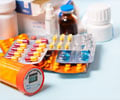
"Practices that are not optimal are putting patients at unnecessary risk of future drug resistant infections," said CDC director Tom Frieden.
Since prescribing practices vary widely by hospital, improved stewardship programs could help streamline practice and cut back on potential errors and excess in prescribing, Frieden said.
"What did really surprise me is that doctors in some hospitals prescribed three times as many antibiotics as others, even though patients were being cared for in similar areas of each hospital," he told reporters.
"This kind of wide difference does provide a warning bell. It provides the clue that a lot of improvement is possible."
The report was based on data from 183 US hospitals in 2011.
Advertisement
When experts reviewed two common scenarios, including patients being treated for urinary tract infections and patients being treated with vancomycin, they found that "antibiotic use could potentially have been improved" in 37 percent of cases.
Advertisement
Cutting back on certain antibiotic prescriptions could help reduce cases of deadly diarrhea caused by a bacterium called Clostridium difficile, sometimes called C. diff or CDI, the report added.
"Models estimate that the total direct and indirect effects from a 30 percent reduction in use of broad-spectrum antibiotics will result in a 26 percent reduction in CDI," said the CDC report.
Infections from C. difficile are usually acquired during medical care and are linked to 14,000 US deaths annually.
Source-AFP














